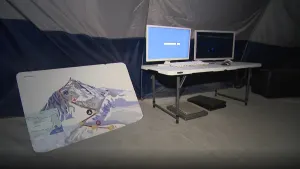More Stories
A World War II veteran from New Jersey has made it his life’s mission to educate people about what he saw as a concentration camp liberator. His story is now the subject of a new exhibit at the National World War II Museum in New Orleans.
“'I am also a Jew.’ It just came out of me and of course once I said that, that was the connection with those poor souls,” says Alan Moskin.
The 95-year-old grew up in Englewood and now lives in Rockland County, New York. He recalls the first words he spoke to Nazi concentration camp survivors as he and other American troops liberated the Gunskirchen Lager camp in Austria on May 4, 1945.
“They came up and held me, and would say ‘Danke Americana. Danke. Thank you.’ Crying. Some of them couldn’t be saved. They died even while we were there. The bodies we had to pick up,” he says.
Moskin enlisted in the military when he was 18 years old. He kept the horrors that he saw that day a secret for 50 years.
“It’s like I took a key and locked up that part of my brain. Didn’t want to find the key. Wasn’t going to talk about it to anybody. I thought it would bring back those nightmares if I did talk about it,” Moskin says.
Then in 1995 he was asked by the leader of a Holocaust education group in Rockland County to share his experiences.
“I was dead wrong. It was like a catharsis. It was like a purging of all that poison that had been bottled up inside of me. It just flowed out of me,” he says.
Since then Moskin has spoken to tens of thousands of students and other groups – a personal mission to keep history and the truth about the Holocaust and the horrors he witnessed firsthand as a liberator, alive.
“It’s a calling with me now. I try to reach as many of the young people as I can so that they know the truth,” he says.
Moskin is now telling his story virtually in an exhibit at the World War II Museum. It is what museum partner USC Shoa Foundation calls an interactive biography. Visitors can ask Moskin their own questions. A computer generates an answer from hundreds of hours of pre-recorded video of Moskin. It is almost as if they are in the room with him.
At 95, Moskin figured he didn't have many more years to tell his story. But with this technology, which is also being expanded for use in schools and other venues, he'll keep telling it long into the future.
“I want these young people when I’m gone to bear witness for me and to tell their children and grandchildren that they heard from someone that was there, that it did happen. And these deniers are full of you know what, when they say it didn’t happen,” Moskin says.
That exhibit is on display through September. There's also a longer oral history video with Moskin on the museum's website.
More from News 12
1:31

What's Cooking: Uncle Giuseppe's Marketplace's prime rib roast
1:30

Looking for a road trip? Check out Big Snow at American Dream in East Rutherford
1:27

What's Cooking: Uncle Giuseppe's quiche lorraine
2:34

Guide: Safety tips to help prevent home burglaries
2:19

Guide: Safety measures to help prevent fires and how to escape one
2:36
